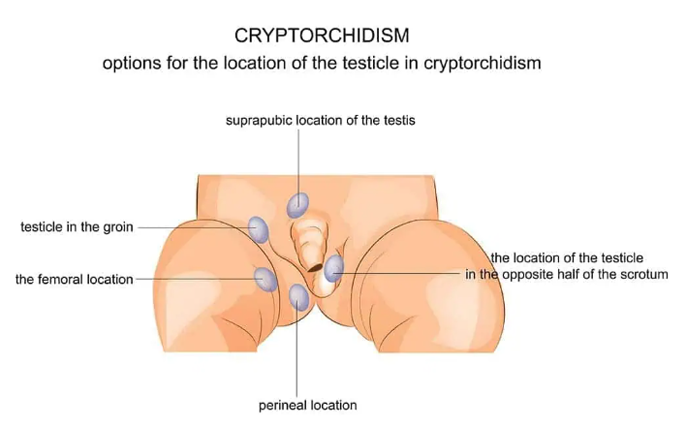Undescended Testicles (Cryptorchidism) – Insights from Dr. Prabhu Karunakaran, Pediatric Urologist in Hyderabad

Understanding Undescended Testicles (Cryptorchidism)
Undescended testicles, also known as cryptorchidism, occur when one or both testicles fail to move into the scrotum before birth. This condition is relatively common in premature infants but can also be seen in full-term babies.
While some testicles descend on their own within the first few months of life, those that remain undescended may require medical evaluation and treatment to avoid long-term complications.
Causes and Risk Factors
The exact cause of undescended testicles is not always clear, but several factors may contribute, including:
- Premature birth: Babies born before full term are at higher risk.
- Hormonal imbalances: Disruptions in hormones that guide testicular descent.
- Genetic factors: Family history may play a role in some cases.
- Low birth weight: Babies with lower weight at birth may have a higher incidence.
Signs and Symptoms
Undescended testicles are typically detected during a newborn’s physical examination. Signs include:
- One or both testicles not visible or felt in the scrotum.
- Asymmetry in the scrotum.
- Potential retractile testicles (testicles that move up and down but are normally positioned in the scrotum).
Why Early Diagnosis Matters
If left untreated, undescended testicles can lead to complications such as:
- Infertility: Higher testicular temperatures inside the body can affect sperm production.
- Increased risk of testicular cancer: Though rare, undescended testicles have a higher risk of developing cancer later in life.
- Hernias and torsion: The abnormal positioning of the testicle increases the risk of hernia and twisting (testicular torsion), which can be painful and require emergency care.

Treatment Options
Dr. Prabhu Karunakaran specializes in treating undescended testicles with a personalized approach. The most common treatment methods include:
- Observation: In some cases, the testicle may descend naturally within the first few months of life.
- Hormonal Therapy: Used in select cases to stimulate testicular descent.
- Surgical Correction (Orchiopexy): A minimally invasive procedure to move the testicle into the scrotum. This is typically recommended between 6 and 12 months of age to reduce long-term risks.
Expert Pediatric Urology Care in Hyderabad
With extensive experience in pediatric urology, Dr. Prabhu Karunakaran ensures that every child receives the best possible care. Early diagnosis and timely intervention can prevent complications and improve long-term health outcomes.
FAQ – Undescended Testicles
1. What is Undescended Testicles?
undescended testicles, or Cryptorchidism, is a condition where one or both testicles fail to move into the scrotum before birth. It is more common in premature babies.
Can the condition resolve on its own?
Yes, in many infants the testicles descend naturally within the first 6 months. If not, medical evaluation is recommended.
What causes undescended testicles?
Causes include premature birth, hormonal imbalances, low birth weight, and family history. The exact cause may not always be identifiable.
How is it diagnosed?
It’s usually detected during a newborn’s physical exam when the testicle(s) are not felt in the scrotum.
What are the risks of not treating it?
If left untreated, risks include infertility, increased risk of testicular cancer, hernias, and testicular torsion.
What treatment options are available?
Observation, hormonal therapy, or surgery (orchiopexy) are used depending on the age and condition of the child. Surgery is most effective between 6–12 months of age.
Is surgery safe for infants?
Yes, orchiopexy is a routine and safe procedure when performed by an experienced pediatric urologist.
Why consult Dr. Prabhu Karunakaran?
Dr. Prabhu Karunakaran is a leading pediatric urologist in Hyderabad, offering expert care, personalized treatment, and early intervention to ensure the best outcomes for children.

Schedule a Consultation
If your child has an undescended testicle, early medical evaluation is essential. Book an appointment with Dr. Prabhu Karunakaran today for expert diagnosis and treatment.


